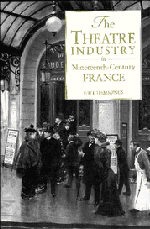Book contents
- Frontmatter
- Contents
- Chronology
- Introduction
- PART I THE AUDIENCES
- 1 Going to the theatre in the nineteenth century
- 2 The auditorium
- 3 Performance times – intervals – annual closures
- 4 First nights and previews
- 5 Order and disorder in the theatres
- 6 Applause and censure
- 7 The claque
- 8 Working-class audiences
- PART II THE ACTING PROFESSION
- PART III THE PROFESSION OF PLAYWRIGHT
- Notes
- Bibliography
- Guide to further reading
- Index
7 - The claque
Published online by Cambridge University Press: 07 December 2009
- Frontmatter
- Contents
- Chronology
- Introduction
- PART I THE AUDIENCES
- 1 Going to the theatre in the nineteenth century
- 2 The auditorium
- 3 Performance times – intervals – annual closures
- 4 First nights and previews
- 5 Order and disorder in the theatres
- 6 Applause and censure
- 7 The claque
- 8 Working-class audiences
- PART II THE ACTING PROFESSION
- PART III THE PROFESSION OF PLAYWRIGHT
- Notes
- Bibliography
- Guide to further reading
- Index
Summary
The claque in the nineteenth century was an institution peculiar to France and even there, confined to Paris. Visitors from abroad found it eccentric, annoying, and quite inexplicable: if an audience was allowed, anywhere else in the world, to be sole judge of a play and applaud it or not as it thought fit, why was it that in this city a small body of men, in all the best theatres, were charged with the function of ensuring as best they could that every play and every actor in it should be cheered to the rafters? And why, in spite of complaints and objections from nearly everyone with an interest in the theatre, and in the teeth of every effort to rid the stage of this parasitic growth, did the claque persist and prosper from one end of the century to the other?
In eighteenth-century French the verb claquer was in common use in the sense of to clap in an exaggerated fashion. It occurs, for example, in an entry dated 10 April 1763 in Bachaumont's Mémories secrets, where he records that the Comédie-Française actress Mile Dubois sang a solo in one of the concerts of spiritual music which, as was customary, took the place of dramatic performances over Easter. She was not a professional singer but, he remarks, ‘elle a été extrêmement claquée et passablement applaudie’, implying that she received the meed of applause to which she was entitled but, in addition, was violently clapped by a section of the audience. It should be added that this particular meaning of the word is obsolete in modern French.
- Type
- Chapter
- Information
- The Theatre Industry in Nineteenth-Century France , pp. 101 - 116Publisher: Cambridge University PressPrint publication year: 1993



